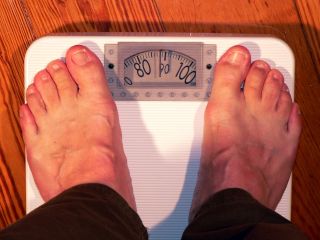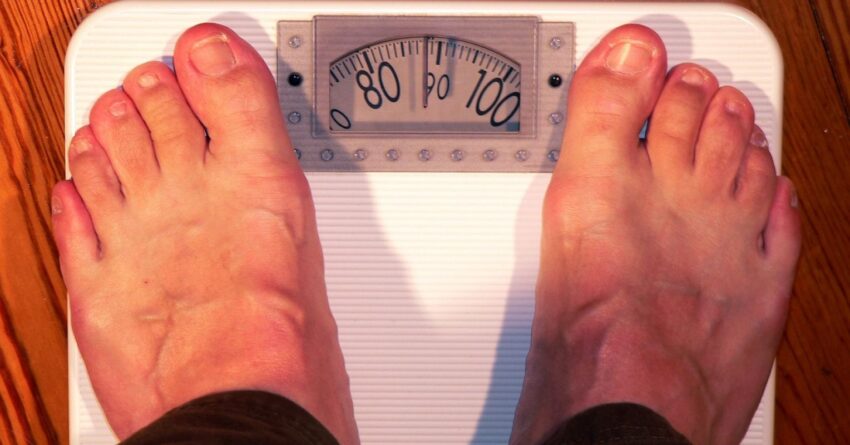
Source: Geralt/ Pixabay
For some people, there’s so much anxiety and reactivity associated with the scale that the drawbacks of weighing yourself outweigh the benefits (pun intended).
“But the scale is supposed to piss you off,” a client once told me. “That’s how it motivates you to be better.”
For this client, the scale was just one more feedback mechanism, triggering the little voice inside that says, “Let’s focus. You can handle this. You can do better.”
The truth is that weighing yourself regularly can help manage your weight. Study after study has shown that people who regularly monitor their weight have greater success losing and/or maintaining their desired weight.
Losing weight with the scale is one thing. Feeling good about getting on the scale is another. How your identity and personality interact with the scale can mean the difference between helpful feedback and strong emotional reactions.
Things such as your temperament, ethnicity, race, socioeconomic status, and past dieting failures all play a role in how much the scale might impact your day. The literature hints that frequent self-weighing may be harmful to certain individuals, especially adolescents or those preoccupied with body weight or shape.
Anecdotally, I’ve seen too many people, myself included, thrown into a tizzy by the number on the scale. Even if you know it’s not an indicator of your self-worth, the scale becomes just one more reminder of how you’re falling short, and one more tool for self-flagellation that can undermine your psychological and emotional health.
This can become a slippery slope for all sorts of disordered behaviors like restricting food or over-exercising.
This creates a bind: You don’t want to fall into unhealthy eating patterns nor do you feel amicable towards your scale. What should you do?
Here are six ways to overcome scale anxiety and get the scale working for you rather than against you.
1. Accept Harsh Social Realities
Weighing yourself means confronting harsh social realities that certain bodies have an easier time being an “acceptable” weight than others. Our cultural discourse objectifies bodies based on weight as normal or abnormal, healthy or unhealthy, or good or bad.
The result is that “healthy,” “lean,” and “acceptable” have become conflated in all sorts of damaging ways. This is especially true if you inhabit a body that has been marginalized, stigmatized, or looked down upon because of shape or size.
Accepting that the bodyweight game is rigged and not everyone starts with the same advantages is tantamount to focusing on what you can do to empower yourself, not what you can’t.
2. Assess Your Goal(s)
Determine your readiness. Is now the right time to introduce the scale in your life if you’ve been without it for some time? To get at the heart of this question, try asking yourself, “What do I truly want for my body, today and tomorrow?”
- Do you want to lose weight? Why? Is it medically necessary?
- Do you want to feel sexy, acceptable, and loved? What number on the scale will give you that feeling?
- Do you want robust well-being? Is there a number associated with being well?
- Do you want freedom of movement or to run, skip, and play? Is there a number that will make that easier for you?
- Do you want to wake up and look at your body in the mirror and not be haunted by poor decisions and past disappointments? At what weight will you be able to inhibit your body from a place of love?
Maybe you want all of the above. Accepting blended motivations is important. Different parts of you want different things.
With these different motives comes the confusing intermingling that weight is a measure of your relationship to gravity, your general health, and your desirability or worth as a person. While the latter is objectively not true, parts of you believe it is.
3. Take Care of Your Vulnerable Parts
The parts of you that are emotionally attached to weighing a certain amount will recoil when the scale disagrees with how they think things should be. This moment of visceral reaction—the feeling of aversion, contraction, or upset that happens when you step on the scale—is an opportunity to meet your vulnerable parts with compassion.
These parts are often younger and feel wounded or helpless. Promise them you’ll love them no matter what the scale says. Meet them with a compassionate voice rather than a critical one. This is your chance to give them what they never got before.
It can help to commit to this out loud before weighing yourself. I suggest putting a hand on your heart and saying to your vulnerable parts, “I fully and unconditionally accept you. You are a part of me waiting to be loved. I’m here for you now.” Then step on the scale with one loving breath.
4. Scales and Emotions Give Data, Not Directives
Remind yourself that numbers are just data, not judgments of worth. Similarly, your emotional reaction to the scale is also data, not a directive. You don’t have to tailspin just because a vulnerable part of you feels let down by the scale. Feelings don’t have to be injunctions.
Try to make space for that feeling elicited by the number on the scale, while recognizing you are so much more than a feeling. You are so much more than just your body, and by proxy, your body weight.
Your kindness, courage, and other qualities are not impacted by whether the scale goes up or down.
Although you can’t escape the dualities of life in a body, you can lean into the higher perspective that all things are impermanent and changing, including your weight. This offers a little wiggle room to detach from the number or emotion and see them both as data nudging you to take good care of your earthly vessel.
5. Shift From Control to Collaboration
The implicit message behind the scale is one of control, domination, and micromanagement. Why weigh yourself if not to force your body to submit to some preconceived ideal—the fat-phobic perspective says. Break this mind-over-body habit and focus on collaboration. How can you work with your body rather than on it?
You weren’t put on earth to force your body to assume a particular weight. What the scale is telling you is not whether you’re good or bad, but if you repeated yesterday for the rest of the year, where might you end up?
This should lead you to an ethics of care, not criticism. Can you create conditions today that allow your body to thrive tomorrow? Can you do this without self-critique or falling into extremes of excess or deficiency?
The need for control often stems from a deep mistrust of the body. You don’t believe it isn’t going to make you overeat or let you down. Yet no matter what you put into your mouth, your body finds a way to take what it needs and store or discard the rest.
It’s very wise, and truthfully, it isn’t trying to ruin your day. Understanding that your body has no ulterior motive than keeping alive helps you rebuild trust that you don’t need to control it.
6. Make Weighing Yourself a Daily Ritual
If you’ve felt thrown by the scale in the past, the above steps can help in two ways:
- Heal the wounded parts of you that react emotionally to changes in your body weight.
- Elevate stepping on the scale from a scary chore to a sacred ritual.
The last step is making it a daily habit. This allows you to reconnect with your body, care for your vulnerable parts, and get in touch with your highest aspirations—every day. It becomes a form of intention-setting and orienting towards what you want more of in your life much in the way journaling or prayer acts as a daily reminder to be your best self.
When you can transcend and include the opposing perspectives that say, “What you measure you can manage, ” and “Your weight has nothing to do with your worth as a human,” you’re ready to use the scale as a practice in cultivating compassionate embodiment and skillful action.
